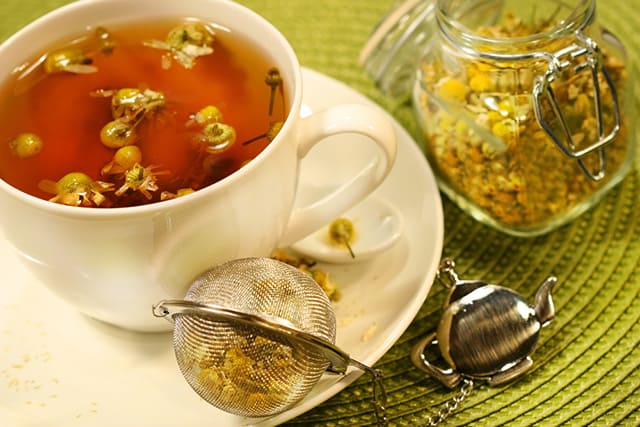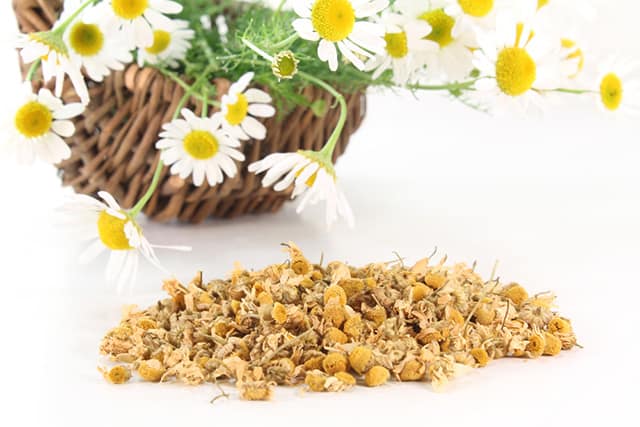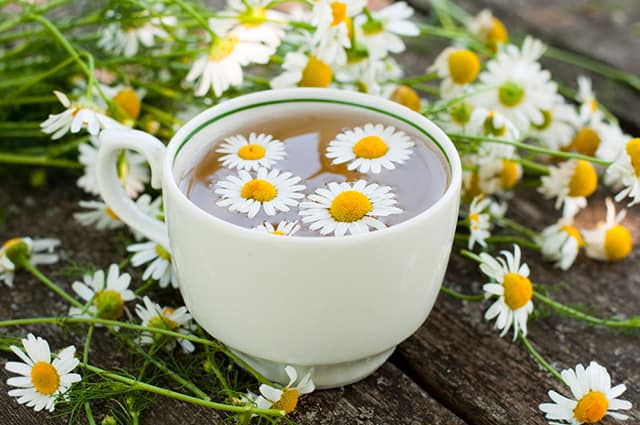We’ve all had one of those nights, or maybe even a few, where we just can’t seem to catch some really good Z’s or fall asleep at all for that matter. We sometimes lay there for hours just thinking about the day ahead, which is no good for our health or our hearts.
Rather than pumping your body full of sleeping pills, try a natural herbal route, such as chamomile tea. This powerful herb has a wide variety of benefits for you that you may not even be aware of. It’s one of the most versatile medicinal herbs known to man thanks to its antioxidants for disease-fighting and sleep assistance properties.
You may want to read: Best Brands for Chamomile Tea
What Is Chamomile Tea?
This is the first question that comes to a lot of people’s minds when they hear about this natural sleep aid. What on earth is chamomile tea? Well, let’s break it down, shall we?
Chamomile is an herb that has been utilized for centuries, dating back to ancient Egypt, to treat a number of issues. Today, it is widely used for sleeping. It’s very easily accessible in pretty much all supermarkets, large retail stores, and drug stores. You can buy it already in a tea bag or you can make one yourself. Once consumed, the apigenin goes to work. It’s a phenolic flavonoid that is linked with sleep and tranquility enhancing effects. The best part about it is that it does not contain caffeine!
Back in 2009, there was a study funded by the National Center for Complementary and Alternative Medicine that reviewed the effectiveness of chamomile tea in patients who were diagnosed with anxiety. Long story short, this herb was found to reduce stress and anxiety. But what about sleep? Well, if you’re anxious or stress do you think you’re going to sleep well? Probably not! This is why it’s recommended that you drink a glass of this tea before bedtime to help relax your body.
For some chamomile tea recipes, click here!
What Is Chamomile Tea Good For?
The scientific name for it is Matricaria recutita and it’s used by a lot of natural healers to treat a wide range of health issues such as inflamed gums, infections, rashes, muscle spasms, colds, and digestive disorders. Today, it’s mostly used to combat insomnia, reduce anxiety and elevate your mood.
There have been a number of proven benefits of drinking this powerful herb and here’s the best part for those who are worried about their diets or too many calories, this drink only contains two calories, two milligrams of sodium and absolutely no cholesterol. The proven effects of improvement of certain health conditions of this drink include:
- Reduction of anxiety and depression
- Allergy fighter
- Insomnia Cure
- Ulcers
- Wounds
- Anti-inflammatory
- Natural arthritis cure
- Hemorrhoids
- PMS
- Muscle spasms
- Gastrointestinal disorders
There may be more lingering around, but these are the main ones that have been 100% proven effective.
How Can It Do So Much?
You see, chamomile can be used in dozens of ways to soothe the body and it all depends on how you prepare the herb in question. You can diffuse it at home to help you sleep or drink it as a tea, apply the oil to the skin for bug bites, itching and eczema, you can also add it to toothpaste or mouthwash to cure toothaches and inflammation. The most popular way to use this herb is to ingest it. It can clean your liver and heal digestive tissues, among other things. In this day and age, it’s possible to use this herb in just about anything and in any way to promote better health and healing.
Is Chamomile Tea Safe?
Generally, yes it’s safe. However, if you have a pollen allergy, especially to ragweed, it may cause an allergic reaction and you should not use it. It may also interfere with anticoagulants. The FDA does not regulate dietary supplements as it does regular medications and can be sold with limited to no research on how effective it really is.
The University of Maryland Medical Center recommends limiting your intake of chamomile to half a cup per day for children under 5 years old. Adults may be able to consume 1 to 4 cups per day or you can use it as an extract, which is standardized to 1.2 percent apigenin in capsule form. You can also add 5 to 10 drops of it in the essential form to bath water for a relaxing soak.
Chamomile Tea Side Effects
Although this herb is considered relatively safe, there are some side effects associated with it such as:
- Nausea
- Vomiting
- Allergic reaction
- Blood thinner interference
As always, consult with your doctor before taking this herb in any form if you have allergies or take prescription medications.
Best Chamomile Tea For Sleep
Honestly, there really isn’t a “best” chamomile tea for sleeping, it should all taste the same if it’s prepared properly, no matter what brand you choose. In terms of ingredients, you should look closely for any other herbs or additives. The best chamomile is organic if you can find it, however, you may have to travel to a health food store or buy it online.
One issue that you may have is whether you want it in a tea bag or loose leaf variety. Some people say that loose leaf tastes better, but it can be rather difficult to locate and it’s inconvenient to prepare.
Preparing The Tea
If you are looking for a simple way to prepare your tea, here it is.
- Place your tea bag or infuser in the bottom of your favorite mug
- Pour boiling water over it
- Let steep for at least 3 minutes
- Add any flavoring you want such as honey or lemon
- Drink up!
The longer you allow it to steep, the richer and stronger the flavor. Don’t let it steep for any more than 10 minutes. The best time to drink this chamomile tea creation is about 30 minutes before bed. It’s widely regarded as a mild tranquilizer and sleep-inducer. The sedative effects from the apigenin occur because it binds to the benzodiazepine receptors in the brain.
You may want to check out: Best Bedtime Tea
Conclusion
Chamomile is by far the most recommended natural sleep aid that there. It’s caffeine-free, contains no cholesterol and it’s proven to reduce stress and anxiety, among other things. Why is it that it feels so good to drink this tea before bed? Well, it’s called the placebo effect. We think that it relaxes us, therefore it does. It’s the same concept behind the warm milk idea.
The other part of it is that by brewing it every night, you’re creating a ritual, which is another way to wind down for a restful night’s sleep. No matter how you choose to ingest this herb, it’s been proven to cure insomnia, among other things. So, read up on some recipes, get yourself into a comfy bed and drink your tea.





